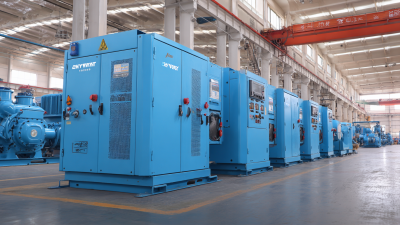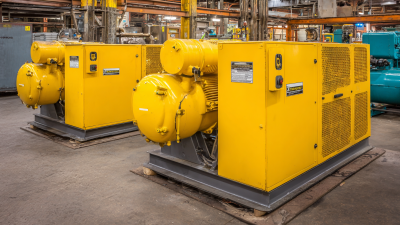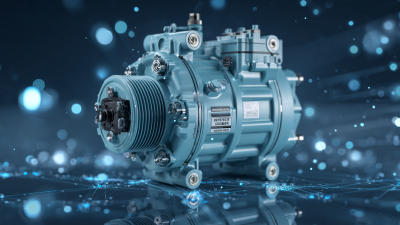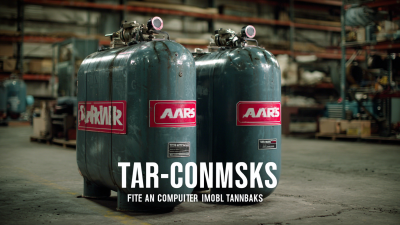Unlocking Efficiency: The Advantages of Choosing Industrial Compressors for Your Business
In today's fast-paced industrial landscape, the pursuit of efficiency and productivity is more crucial than ever. One of the key components that can significantly enhance operational effectiveness is the implementation of industrial compressors. These essential machines not only provide a reliable source of compressed air but also play a pivotal role in improving workflow, reducing downtime, and optimizing energy consumption. As businesses strive to cut costs and increase output, understanding the various advantages of choosing the right industrial compressors becomes imperative. This ultimate guide will delve into the numerous benefits of industrial compressors, including their versatility, energy efficiency, and suitability for various applications, helping you unlock the full potential of your operations. Whether you're managing a manufacturing plant, a construction site, or any other industrial facility, understanding the impact of industrial compressors can set the foundation for a more streamlined and effective business model.

Benefits of Industrial Compressors in Streamlining Operations
Industrial compressors play a pivotal role in streamlining operations across a wide array of industries. According to a report by MarketsandMarkets, the global air compressor market is projected to grow from USD 30.5 billion in 2020 to USD 39.5 billion by 2026, reflecting an annual growth rate of 4.6%. This remarkable expansion is driven by the growing demand for energy-efficient solutions in manufacturing processes, where industrial compressors are known to enhance productivity and reduce operational costs.
One significant advantage of industrial compressors is their ability to improve overall efficiency in production lines. Utilizing advanced technologies such as variable speed drive (VSD) systems can lead to energy savings of up to 35%, as highlighted in a study by the U.S. Department of Energy. This reduction in energy consumption not only mitigates long-term expenses but also supports sustainability goals by decreasing environmental impact. Moreover, with the integration of smart monitoring systems, businesses can achieve real-time data analysis, allowing for proactive maintenance and minimizing downtime.
In high-demand sectors such as construction and automotive, the reliability and durability of industrial compressors become even more crucial. A report from Grand View Research indicates that the need for reliable compressed air systems in these industries is propelling the adoption of advanced compressor technologies. This ensures that high-volume operations can maintain continuous workflows without disruptions, ultimately driving higher profit margins and operational success.

Factors to Consider When Choosing an Industrial Compressor
When selecting an industrial compressor for your business, several critical factors must be taken into account to ensure optimal performance and efficiency. First and foremost, the required pressure and flow rate are pivotal. Different applications demand varying levels of airflow and pressure; understanding your specific needs can help you choose the right compressor type—whether it's rotary screw, piston, or scroll—tailored for your operational requirements.
Another key consideration is the energy efficiency of the compressor. Industrial compressors can be significant contributors to operational costs, so investing in energy-efficient models can yield substantial savings over time. Additionally, assessing the noise level and maintenance needs of the compressor is essential, as quieter models can improve workplace comfort and productivity. Finally, factor in the brand’s reputation and after-sales support, ensuring that you have reliable service and parts availability to minimize downtime in your operations.
Comparing Industrial Compressors with Alternative Solutions
When considering industrial compressors for your business, it's essential to compare them with alternative solutions to determine the best fit for your needs. Industrial compressors are known for their high efficiency and reliability, making them an ideal choice for continuous operations in various sectors. Unlike traditional air compression systems, advanced industrial compressors offer significant energy savings and reduced operational costs, driving improved profitability. The shift towards energy-efficient models allows businesses to not only lower their overall expenditure but also enhance their environmental sustainability.
Moreover, innovations in compressor technology are paving the way for enhanced performance and adaptability. For instance, the integration of compressors with renewable energy sources and industrial waste heat systems marks a significant advancement in optimizing energy use. As markets grow, such as the hydrogen compressor market, the focus on developing resilient infrastructure becomes crucial. Industrial compressors play a vital role in supporting these advancements, providing solutions that contribute to a lower carbon footprint while meeting the increasing energy demands of modern businesses. Ultimately, the strategic choice of compressors over alternative solutions can unlock efficiency, leading to lasting benefits for your enterprise.

Enhancing Productivity: Real-World Applications of Industrial Compressors
Industrial compressors play a crucial role in enhancing productivity across various sectors by streamlining operations and optimizing resource utilization. Their applications extend from manufacturing to food processing, providing essential power for pneumatic tools and refrigeration systems. For instance, in the manufacturing industry, compressors ensure a consistent supply of compressed air, which is vital for operating machinery and assembly lines, ultimately minimizing downtime and improving overall efficiency.
Furthermore, the integration of advanced technologies into industrial compressors is driving their evolution. Data-driven optimization techniques, like dynamic real-time optimization, enable businesses to monitor and adjust compressor performance in real time, leading to significant energy savings and reduced operational costs. The future looks promising, as the compressors and vacuum pumps market is expected to witness substantial growth, indicating a rising recognition of their strategic importance in enhancing operational efficiency. As industries continue to seek ways to improve their processes, the contribution of industrial compressors will remain at the forefront of innovation and productivity enhancements.
Unlocking Efficiency: The Advantages of Choosing Industrial Compressors for Your Business
| Application | Type of Compressor | Efficiency Gain (%) | Major Benefits |
|---|---|---|---|
| Manufacturing | Rotary Screw Compressor | 25% | Continuous operation, low maintenance |
| Food Processing | Reciprocating Compressor | 20% | Maintains product quality, energy efficiency |
| Construction | Portable Air Compressor | 30% | Enhanced mobility, versatile applications |
| Healthcare | Scroll Compressor | 15% | Quiet operation, reliability |
| HVAC | Centrifugal Compressor | 35% | High capacity, energy-efficient |
Maintaining Efficiency: Best Practices for Compressor Management
Effective management of industrial compressors is crucial for optimizing operational efficiency in any business. According to the U.S. Department of Energy, compressed air systems account for approximately 10% of industrial energy use, making it imperative for organizations to adopt best practices in their compressor management. Regular maintenance, such as checking for air leaks and ensuring consistent pressure levels, can reduce energy consumption by up to 30%. Implementing routine maintenance schedules not only enhances equipment longevity but also minimizes unplanned downtime, which can lead to significant financial losses.
Additionally, monitoring system performance using advanced analytics can provide valuable insights into compressor efficiency. The Compressed Air Challenge reports that integrating control systems with real-time data can improve energy efficiency by 10-20%. Businesses can benefit from conducting periodic audits to assess their compressor systems' performance and identify areas for improvement. By investing in training for staff and utilizing smart technologies, companies can ensure their compressors operate at peak efficiency, contributing to overall operational success.
Unlocking Efficiency: Compressor Management Metrics
This chart illustrates the efficiency of various types of industrial compressors over six months based on energy consumption and output performance.
Related Posts
-

Choosing Top Quality Manufacturers for Best Industrial Compressors
-

Global Export Powerhouse Producing the Finest Rotary Screw Air Compressors from China
-

Benefits of Choosing the Best Screw Compressors for Your Business Needs
-

Unlocking Efficiency with Best Rotary Screw Air Compressors Technical Specs and Buying Guide
-

Solutions for Sourcing the Best Compressor Parts: Boost Efficiency with Quality Components
-

The Future of Innovative Air Compressor Tanks for Global Buyers


